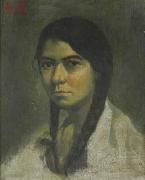La Peinture à l'huile en gros de Chine & Encadre |
|||||||||||

|
|||||||||||
|
|
|
||||||||||||||
|
Jose Ferraz de Almeida Junior
(8 May 1850 - 13 November 1899) was a Brazilian painter of the 19th century. He is widely regarded as the most important Brazilian realist painter of the 19th century, and a major inspiration for the modernist painters. While most Brazilian academic artists made their fame painting mythological or historical subjects, Almeida Junior would become popular for painting rural figures, especially farmers and the caipira violeiro , the countrymen that are a kind of a symbol of the rural areas of the São Paulo state. While most realist painters used farmers and countrymen as an allegory of workers, Almeida Junior would paint his caipiras mostly on leisure time. He would also produce touching images of upscale landowners. The Bandeirantes, the ruthless explorers of colonial Brazil, would be depicted in the A partida da monção, showing an expedition on the Tiete River. Almeida Junior was born in the city of Itu, then a small town in the state of São Paulo. After becoming a sensation in his town he would be invited to study in the Brazilian Imperial Fine Arts Academy of Rio de Janeiro, but in 1876 would study in France after being granted a scholarship by emperor Pedro II of Brazil in person in the city of Moji-Mirim. He would have Alexandre Cabanel as one of his masters. In 1877 he was already enrolled in the School of Fine Arts in Paris. He took part at the Salon de Paris with several works of art in 1879 (Retrato do Dr. Jose de Magalhães), 1880 (O Derrubador Brasileiro) and (Remorso de Judas), 1881 (Fuga para o Egito) and 1882 (Descanso do Modelo) He admired the French realist and naturalist painting (a major influence at his work), and, after returning to Brazil in 1882, became of the leading names in Brazilian realist painting. He was stabbed to death by the husband of his mistress on November 13, 1899 in Piracicaba. |
||||||||||||||
|
|
||||||||||||||
|
||||||||||||||
|
|
||||||||||||||
| Jose Ferraz de Almeida Junior
(8 May 1850 - 13 November 1899) was a Brazilian painter of the 19th century. He is widely regarded as the most important Brazilian realist painter of the 19th century, and a major inspiration for the modernist painters. While most Brazilian academic artists made their fame painting mythological or historical subjects, Almeida Junior would become popular for painting rural figures, especially farmers and the caipira violeiro , the countrymen that are a kind of a symbol of the rural areas of the São Paulo state. While most realist painters used farmers and countrymen as an allegory of workers, Almeida Junior would paint his caipiras mostly on leisure time. He would also produce touching images of upscale landowners. The Bandeirantes, the ruthless explorers of colonial Brazil, would be depicted in the A partida da monção, showing an expedition on the Tiete River. Almeida Junior was born in the city of Itu, then a small town in the state of São Paulo. After becoming a sensation in his town he would be invited to study in the Brazilian Imperial Fine Arts Academy of Rio de Janeiro, but in 1876 would study in France after being granted a scholarship by emperor Pedro II of Brazil in person in the city of Moji-Mirim. He would have Alexandre Cabanel as one of his masters. In 1877 he was already enrolled in the School of Fine Arts in Paris. He took part at the Salon de Paris with several works of art in 1879 (Retrato do Dr. Jose de Magalhães), 1880 (O Derrubador Brasileiro) and (Remorso de Judas), 1881 (Fuga para o Egito) and 1882 (Descanso do Modelo) He admired the French realist and naturalist painting (a major influence at his work), and, after returning to Brazil in 1882, became of the leading names in Brazilian realist painting. He was stabbed to death by the husband of his mistress on November 13, 1899 in Piracicaba. The_model oil Dimensions 46 x 38 cm cyf oil Dimensions 46 x 38 cm cyf |
||||||||||||||
|
Related Paintings to Jose Ferraz de Almeida Junior :. |
||||||||||||||
|
|
||||||||||||||
|
|
||||||||||||||
|
CONTACTER DES Etats-Unis |







